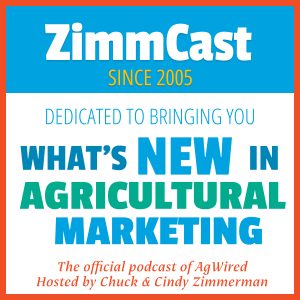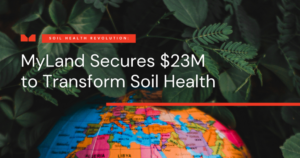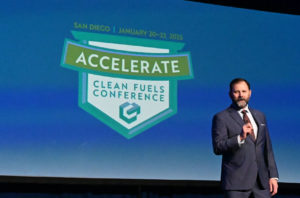Ethanol Report on Working with New Administration
 President Donald Trump has been very busy since his inauguration issuing executive orders, making changes, and freezing funding, but how will his actions impact the ethanol industry?
President Donald Trump has been very busy since his inauguration issuing executive orders, making changes, and freezing funding, but how will his actions impact the ethanol industry?
In this edition of the Ethanol Report podcast, Renewable Fuels Association President and CEO Geoff Cooper comments on some of the actions President Trump has taken and where ethanol’s priorities stand in the new Congress and the new administration, including newly- confirmed EPA Administrator Lee Zeldin.
Ethanol Report 1-29-25 24:25The Ethanol Report is a podcast about the latest news and information in the ethanol industry that has been sponsored by the Renewable Fuels Association since 2008.
Choose an option to subscribe
Precision Ag News 1/30
CattleCon 2025 Preview
 It’s time for the 2025 CattleCon. To get a preview of this year’s event I spoke with Kristin Torres, Executive Director of Meetings and Event, NCBA. She covers all the activities and if you’re interested you can also just link to the schedule here.
It’s time for the 2025 CattleCon. To get a preview of this year’s event I spoke with Kristin Torres, Executive Director of Meetings and Event, NCBA. She covers all the activities and if you’re interested you can also just link to the schedule here.
CattleCon is where the beef industry meets! We’re headed to San Antonio February 4-6, 2025! At CattleCon, you’ll discover a unique and comprehensive experience that brings together education, networking, business opportunities, advocacy, and fun for the whole family, all under one roof. Join us at CattleCon, the ultimate destination where the beef industry meets to learn, connect, grow, and enjoy.
You can listen to my interview with Kristin here: Interview with Kristin Torres (7:09)
ZimmCast 741 – Clean Fuels in 2025
 Hello and welcome to the ZimmCast.
Hello and welcome to the ZimmCast.
While Cindy was home during the major snow storm in Florida I was attending the Clean Fuels Conference in San Diego, CA. The weather was delightful for the conference. However, in the Pensacola, FL area there was eight to ten inches of snow, something that hasn’t happened in over 150 years! But it has all melted and we’re mostly back to normal.
So, let’s talk about clean fuels. We created a virtual ag newsroom once again for the conference that used to be named the National Biodiesel Conference. It was the first one we created many years ago. You can find that newsroom with photos, interviews and session audio right here.
In this episode I’m going to share some of the interviews I did. So, let’s get started. First up I interviewed Kent Engelbrecht, ADM, serving as Chairman of the Clean Fuels Alliance America. Following him is Kurt Kovarik, VP of Government Affairs, Clean Fuels; then Tom Verry, Director of Outreach and Development; and to close things up I interviewed Donnell Rehagen, CEO, Clean Fuels.
In addition to the virtual ag newsroom on AgNewsWire we also posted content onto the Clean Fuels Conference Blog which you can find here.
Now that I’ve been catching up I’m getting ready for the CattleCon 2025 working with the National Cattlemen’s Beef Association. At the same time Cindy will be at the Crop Insurance and Reinsurance Bureau annual meeting. It’s just that busy time of the year.
Listen to the episode here:
ZimmCast 741 - Clean Fuels in 2025 (18:01)
That’s the ZimmCast for now. Please let us know if you have ideas for a future podcast. Just email Chuck at chuck@zimmcomm.biz.
We hope you enjoyed it and thank you for listening.
Subscribe to the ZimmCast in:
Animal Ag News 1/29
MyLand Secures $23 Million to Transform Soil Health
 Soil health company MyLand has secured $23 million in funding in a round led by Proterra Investment Partners LP with the goal of supporting MyLand’s growth across the U.S. and into international markets to transform soil health.
Soil health company MyLand has secured $23 million in funding in a round led by Proterra Investment Partners LP with the goal of supporting MyLand’s growth across the U.S. and into international markets to transform soil health.
“This funding, secured in a highly challenging market and at an incremental valuation, is a testament to the growing recognition that soil health is foundational to agricultural success,” said Dane Hague, Co-Founder and CEO of MyLand. “The proven results of our service—delivering strong economic returns to farming partners across geographies, soil types, and crops—demonstrate the critical role MyLand plays in modern agriculture. Soil is an essential natural resource, and our unique ability to rapidly rebuild it has far-reaching benefits: improved water and nutrient efficiency, enhanced nutrition, greater climate resilience, and better livelihoods for the farmers and ranchers who provide the food on our tables.”
MyLand’s innovative Soil as a Service™ uses live, native microalgae to rejuvenate soil health and improve productivity, profitability, and sustainability for growers, integrating seamlessly into existing farm operations. MyLand’s solution offers a simple and scalable path for farmers to improve soil health and produce more with fewer resources, contributing to a more resilient and sustainable food system.
This $23 million financing follows a $20 million Hardware as a Service loan facility from PaceZero Capital Partners in October 2024. Additional investors in the round included existing shareholders, namely Climate IC and the Borden Family Trust, multiple Climate IC LPs, and FarmClub Investments. Collectively, this funding will enable MyLand to scale operations and expand its reach in key agricultural regions. With a strong presence in California, Texas, Arizona, Washington, Oregon, and Alberta, MyLand is poised to deepen its impact on North American agriculture while exploring opportunities for growth in new markets.
Vilsack Named CEO of World Food Prize Foundation
 He just turned 74 last month, but former Secretary of Agriculture Tom Vilsack has a new job already, as CEO of the World Food Prize Foundation, located in Des Moines. Beginning March 1, “Vilsack will leverage his extensive leadership and diplomatic experience to enhance the Foundation’s global impact in food security and sustainable agriculture.”
He just turned 74 last month, but former Secretary of Agriculture Tom Vilsack has a new job already, as CEO of the World Food Prize Foundation, located in Des Moines. Beginning March 1, “Vilsack will leverage his extensive leadership and diplomatic experience to enhance the Foundation’s global impact in food security and sustainable agriculture.”
Vilsack’s appointment builds on his longstanding relationship with the Foundation, where he served on the Council of Advisors and Board of Directors, offering invaluable insights that have shaped its mission and initiatives. He has served two terms as U.S. Secretary of Agriculture and two terms as governor of Iowa, in addition to involvement with several organizations focused on agricultural trade and sustainable food production. His exposure and collaboration with the Foundation over the past two decades reflects his life-long dedication to advancing agriculture and food security.
“The World Food Prize Foundation has a phenomenal and important history of advancing innovation to address global food security,” said Vilsack. “I am honored to have the opportunity to build on that legacy, working closely with Mashal Husain and the talented team to extend the Foundation’s impact worldwide. I look forward to forging new partnerships, helping bring to life new solutions in the fight against hunger and championing efforts to ensure a sustainable and equitable food system for future generations.”
Clean Fuels Chair Confident Moving Forward
 Kent Engelbrecht serves as director of North American Biodiesel Trade Policy for ADM, one of the world’s leading biodiesel producers, oilseed crushers, and suppliers of soy and canola feedstocks for the renewable liquid fuels industry.
Kent Engelbrecht serves as director of North American Biodiesel Trade Policy for ADM, one of the world’s leading biodiesel producers, oilseed crushers, and suppliers of soy and canola feedstocks for the renewable liquid fuels industry.
Engelbrecht is also Chairman of the Clean Fuels America Alliance, and he is Chairman of the California Advanced Biofuels Alliance (CABA), as well as Advanced Biofuels Canada (ABFC). He was chair of the National Biodiesel Board in 2017 before it became Clean Fuels at a time that was very similar to today.
“It was another difficult time in the industry,” he said in remarks at the Clean Fuels Conference in San Diego last week. “In many ways, it was similar to what we’re facing now. We’ve got headwinds generated by issues that aren’t entirely within our control. Back then we had issues with tax credits, RFS, and we weren’t really sure what to expect with the new president for the next 4 years. Sound familiar?”
Engelbrecht says it created a situation where the industry had to go beyond soybeans and build a coalition of complimentary feedstocks and technologies.
“And we’ve created our path forward. We’ve established renewable diesel as an important part of the country’s energy supply and laid the groundwork for sustainable aviation fuel. Dozens of states across the country have added new clean fuel incentives,” said Engelbrecht. “I look forward to working together as we write this next chapter together.”
Listen to Engelbrecht’s remarks and interview:
Clean Fuels remarks - Kent Engelbrecht, ADM (14:04)



